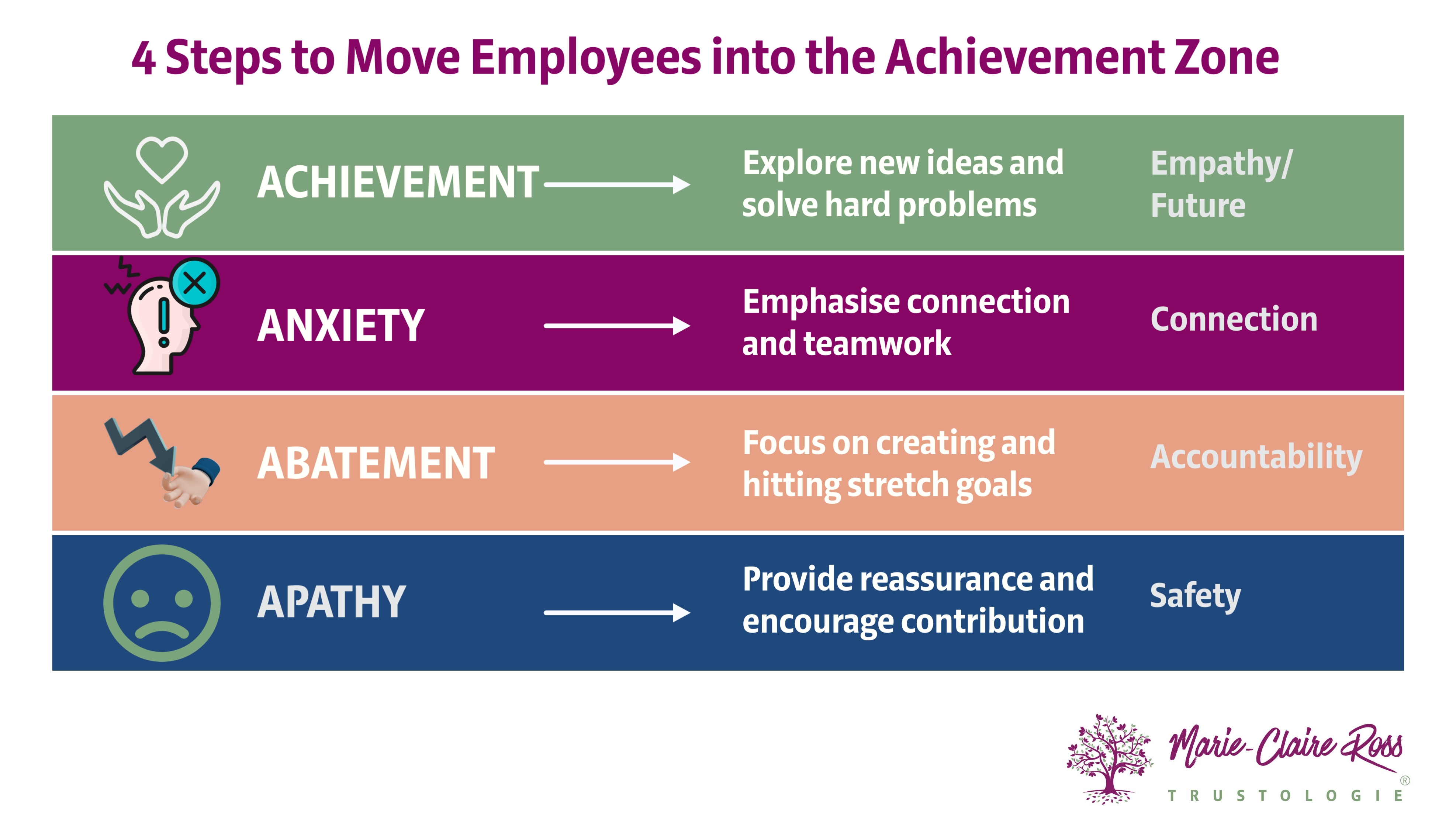11 min read
4 Practical Strategies for Better Emotional Management in the Workplace
I have a friend who often finds herself at the mercy of her emotions. Recently, she called me to rehash a confrontation she’d had with a group of...
Develop leaders, strengthen executive teams and gain deep insights with assessments designed to accelerate trust and performance.

Transform how your leaders think and perform with keynotes that spark connection, trust and high-performance cultures.

Explore practical tools, thought-leadership and resources to help you build trusted, high-performing teams.

Trustologie® is a leadership development consultancy founded by Marie-Claire Ross, specialising in helping executives and managers build high-trust, high-performing teams.

5 min read
Marie-Claire Ross : Updated on April 19, 2023

The pandemic has upended how we work and inspired us to reconsider our lives, as well as our workplace practices and norms.
In the process of redefining when and where we work, the traditional manager role has been challenged, as managers have been expected to take on more responsibilities and demonstrate new skills.
Not only have middle managers had to adapt to leading teams through a pandemic, but also deal with an unusual combination of factors such as supply chain issues, inflation, cost of living pressures, mental health issues, labour shortages and return-to-work mandates.
It's little wonder that Ceridian’s recent Pulse of Talent global report found that 89% of middle managers experienced burnout in 2022, with more than a third (34%) admitting that they don’t feel fulfilled in their current role and three-quarters (74%) actively looking for a new job.
Middle managers are the organisational linchpins that bring people together in an organisation from the top to bottom. Unfortunately, their success is often at the whim of senior leaders who often don't provide enough detail of the the company vision nor access to the reasoning behind strategic decision making.
Essentially, middle managers have all the responsibilities without enough context.
This often means that they err on the side of caution. In my work with organisations, I often find that managers are hesitant to make decisions because they don't receive enough information. This is compounded in cultures were they are heavily scrutinised. In these circumstances, managers second guess themselves and fail to make timely decisions for their teams.
A lack of context reduces psychological safety which contributes to managers feeling anxious - leading to burnout.
Senior leaders must regularly ensure they communicate the vision clearly, explain what high performance looks like and what managers need to do to deliver towards expectations.
For many humans being busy is a badge of honour. It makes us feel important.
Yet, the impact of busyness has done untold damage to our health and personal fulfilment.
Successful leadership in this new environment requires that managers must lead with empathy.
In a 2021 Gartner survey of 4,787 global employees assessing the evolving role of management, only 47% of managers are prepared for this future role. Effective managers of the future are those who can build and maintain fundamentally different relationships with their employees.
Yet, asking managers to lead with more empathy isn't enough. They need to be trained.
This requires supporting leaders to have effective and regular one-on-ones and the ability to have micro performance conversations.
According to a 2021 survey of 4,787 global employees, 75% of HR leaders from midsize companies agree that managers’ roles have expanded, yet roles and teams are not structured to support well-being.
Support can include internal mentors or external coaches. As a leadership coach, I find that most of my work with coaching middle managers involves communicating to executives the bottlenecks and outdated systems that make it tough to lead the frontline. Unintentionally, executives often have tunnel vision with their expectations around the amount of work that needs to get done and the quality that are often hampered by outdated systems or poorly trained employees. My role is often to unravel outdated expectations and processes that are no longer serving management, so they can focus on undetaking higher-impact work. The result is that managers feel more confident and relieved to get the support that they thought would never happen.
A manager's ability to be empathetic increases when they can see they are being supported in the organisation and given the resources to succeed. Whether that be training, more skilled staff, a change in reporting lines, a reduction in tasks or the ability to carve out more time for planning.
We all knew that the pandemic would change how we think about work. Making sense of how organisations can work best moving forward requires supporting managers who have borne the brunt of changing expectations and working conditions.
It is time to overhaul manager's responsibilities and for leadership to show that they matter. Managers have been overlooked and overworked for too long. After all, we can't expect managers to ensure their direct reports feel cared for and connected to them, if they feel neglected.
Highlighting empathy as a leadership development bullet point on your managers’ job descriptions not only creates thriving teams, but also has a tangible business impact. Gartner analysis shows that managers who display high levels of empathy have three times the impact on their employees’ performance than those who display low levels of empathy.
Improving the wellbeing of employees requires improving the wellbeing of managers.
Clearly communicating the context of senior decisions and expectations of high performance, reducing a culture of overwork, improving management training, providing support and reducing priorities or tasks are all steps in the right direction.

11 min read
I have a friend who often finds herself at the mercy of her emotions. Recently, she called me to rehash a confrontation she’d had with a group of...

9 min read
True leadership presence isn’t a performance or a set of charisma hacks; it is the felt experience of who you are being in the room. By cultivating...

13 min read
As teams return from their summer (or winter) break, you may notice subtle shifts in your team’s energy. Even if the end of year was positive, a new...

1. Use more Visuals - 83% of human learning occurs visually. Use lots of photos, videos, diagrams and colour to present training information. Avoid...

Great delegation is about being an accountability partner to help your reports grow their capabilities.

It wasn't that long ago that anyone could be a leader. Work enough hours in a company and before long, you were tapped on the shoulder to lead a team.